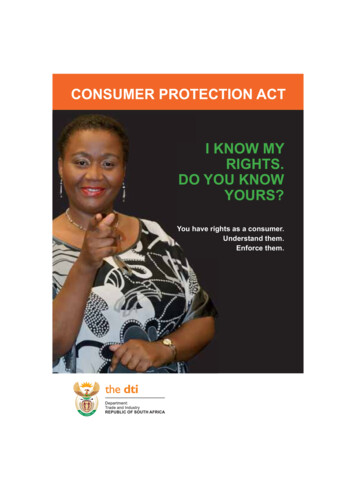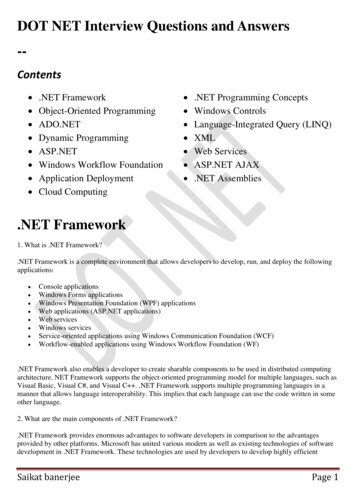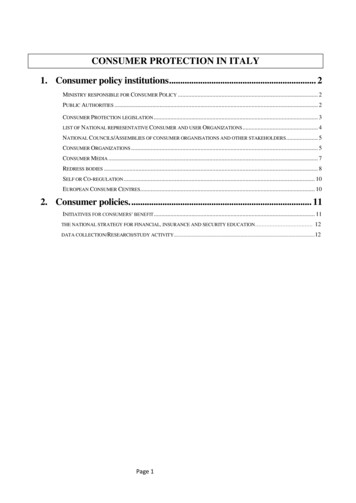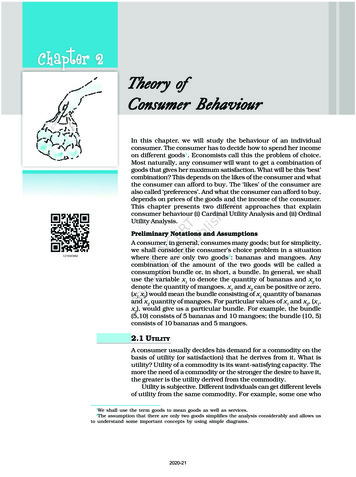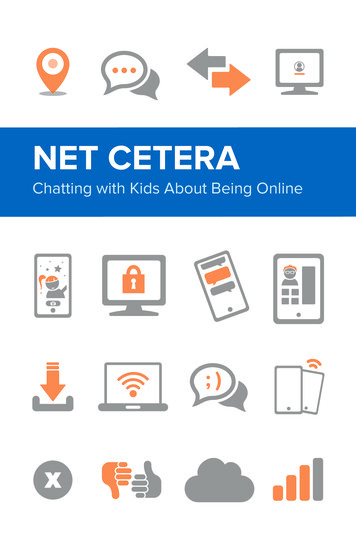
Transcription
NET CETERAChatting with Kids About Being Online
People of allages are:connecting withfriends and familyonlineCommunicating online is a way of life, yet it comes withcertain risks: Inappropriate conductThe online world can feel anonymous. Kidssometimes forget that they’re still accountable fortheir actions. Inappropriate contactSome people online have bad intentions. They mightbe bullies, predators, hackers, or scammers. Inappropriate contentYou may be concerned that your kids could findpornography, violence, or hate speech online.Technology is constantly evolving. So are the risksassociated with it. You can reduce these risks by talkingto your kids about how they communicate — online andoff — and encouraging them to think critically and act in away they can be proud of.downloading appsand accessing contentsharing what they’redoing — and wherethey aresharing photosand videos frommobile devicesbuilding onlineprofiles andreputationsThis guide from the Federal Trade Commissioncovers issues to raise with kids about living theirlives online.Talking to Your Kids . . . . . . . . . . . . . . . . . . . . .2Communicating at Different Ages . . . . . . . . . . . 4Socializing Online . . . . . . . . . . . . . . . . . . . . . .8Using Mobile Devices . . . . . . . . . . . . . . . . . . 12Making Computer Security a Habit . . . . . . . . . 18Protecting Your Child’s Privacy . . . . . . . . . . . . 23
TALKING TO YOUR KIDSThe best way to protect your kids online? Talk to them.While kids value the opinions of their peers, most tendto rely on their parents for help on the issues thatmatter most.Start early.Young kids see their parents using all kinds of devices —and also might be playing games or watching shows onthem. As soon as your child starts using a phone, mobiledevice, or computer, it’s time to talk to them about onlinebehavior and safety.Initiate conversations.Even if your kids are comfortable approaching you, don’twait for them to start the conversation. Use everydayopportunities to talk to your kids about being online.For example, news storiesabout cyberbullying or textingwhile driving can spur aconversation with kids abouttheir experiences and yourexpectations.2 // FTC.gov/KidsOnlineCommunicate your expectations.Be honest about your expectations and how they applyin an online context. Communicating your values clearlycan help your kids make smarter and more thoughtfuldecisions when they face tricky situations. For instance, bespecific about what’s off-limits — and what you consider tobe unacceptable behavior.Be patient and supportive.Resist the urge to rush through these conversations withyour kids. Most kids need to hear information repeated,in small doses, for it to sink in. If you keep talking withyour kids, your patience and persistence will pay off in thelong run.Work hard to keep the lines of communication open, evenif you learn your kid has done something online that youfind inappropriate.Listening and taking their feelings into account helps keepconversations afloat. You may not have all the answers,and being honest about that can go a long way.// 3
COMMUNICATING ATDIFFERENT AGESConsider parental controls.Young KidsSupervision is important.If you’re concerned about what yourkids see online, consider tools withthese features:When very young children start using mobile devices or acomputer, they should be supervised closely by a parentor caregiver. If little kids aren’t supervised online, they maystumble onto content that could scare or confuse them. Filtering and blocking. These tools limit accessto certain sites, apps, words, or images. Someproducts decide what’s filtered; others leavethat to parents.When you’re comfortable that your young children areready to explore on their own, it’s still important to stay inclose touch. You may want to restrict them to sites or appsthat you’ve visited and know to be appropriate — at least interms of their educational or entertainment value. Blocking outgoing content. This software prevents kidsfrom sharing personal information online or via email. Limiting time. This software allows you to limit yourkid’s time online and set the time of day they canaccess the internet. Browsers for kids. These browsers filter words orimages you don’t want your kids to see. Kid-oriented search engines. These perform limitedsearches or filter search results for sites and materialappropriate for kids. Monitoring tools. Software that alerts parents to onlineactivity without blocking access. Some tools record theaddresses of websites a child has visited; others providea warning message when a kid visits certain sites.Monitoring tools can be used with or without a kid’sknowledge. Disabling in-app purchases from your device. Thesesettings can limit or keep kids from making in-apppurchases from your device.4 // FTC.gov/KidsOnline// 5
TweensTweens need to feel “independent” but not alone as theystart exploring on their own. Many 8- to 12-year-olds areadept at finding information online, but they still needguidance to help them understand which sources aretrustworthy.Think about limits.Consider setting limits on how long andhow often they can be online — whetheron computers, phones, or other mobiledevices. For younger tweens, parental controls can beeffective. However, many middle school kids have thetechnical know-how to get around those controls.WHAT CAN YOU DO?Talk about credibility.It’s important to emphasize the concept of credibility. Eventhe most tech-savvy kids need to understand that: not everything they see on the internet is true people online may not be who theyappear to be or say they are once something is posted online, it’snearly impossible to “take it back”information or images they share canbe seen far and wideTalk about manners.TeensTeens are forming their own values and beginning totake on the values of their peers. Many are eager toexperience more independence from their parents.However, they need to learn how to exercise judgmentabout being safe online and act in accordance with theirfamily ethic.Teens have more internet access through mobile devices— as well as more time to themselves — so it isn’t realisticfor you to try to be in the same room when they’re online.They need to know that you and other family memberscan ask them about what they’re doing online.6 // FTC.gov/KidsOnlineBecause they don’t see facial expressions, body language,and other visual cues, teens and tweens may feel free todo or say things online that they wouldn’t offline. Remindthem that real people with real feelings are behind profiles,screen names, and avatars.Talk about expectations.When you talk to your kids, set reasonable expectations.Anticipate how you will react if you find out that they’vedone something online you don’t approve of.If your child confides in you about something scary orinappropriate they’ve encountered online, try to worktogether to prevent it from happening again.// 7
SOCIALIZING ONLINEKids share pictures, videos, thoughts, plans, and theirwhereabouts with friends, family, and sometimes, the worldat large. Socializing online can help kids connect withothers, but it’s important to help your child learn how tonavigate these spaces safely.OversharingSome pitfalls that come with onlinesocializing are sharing too much information,or posting pictures, videos, or words that can damage areputation or hurt someone’s feelings.WHAT CAN YOU DO?Remind your kids that online actions haveconsequences.The words kids write and the images they post haveconsequences offline. Kids should post only what they’re comfortable withothers seeing. Parts of your children’s profiles may beseen by a broader audience than you — or they — arecomfortable with, even if they use privacy settings.Encourage your kids to think about the language theyuse online, and to think before posting pictures andvideos, or altering photos posted by someone else.Employers, college admissions officers, coaches,teachers, and the police may view these posts.8 // FTC.gov/KidsOnline Remind kids that once they post it, they can’t take itback. Even if they delete the information from a site,they have little control over older versions that maybe saved on other people’s devices and may circulateonline. And a message that’s supposed to disappearfrom a friend’s phone? There are still ways to save it.Tell kids to limit what they share. Help your kids understand what information shouldstay private. Tell them why it’s important to keep somethings to themselves. Information like their SocialSecurity number, street address, phone number, andfamily financial information is private and should staythat way. Talk to your teens about avoiding sex talk online.Teens who don’t talk about sex with strangers onlineare less likely to come in contact with predators. Infact, researchers have found that predators usuallydon’t pose as children or teens, and most teens whoare contacted by adults they don’t know find it creepy.Teens should ignore or block them, and trust their gutwhen something feels wrong. Tell kids it’s more than what they post. Information maybe collected and shared even if kids are not posting it.For example, what sites they visit, social media activity,or answers on quizzes may be shared or used foradvertising.Limit access to your kids’ profiles. Use privacy settings. Many social networking sites,chat, and video accounts have adjustable privacysettings, so you and your kids can restrict who hasaccess to kids’ profiles. Talk to your kids about the// 9
importance of these settings, and your expectations forwho should be allowed to view their profile. Review your child’s friends list. Suggest that your kidslimit online “friends” to people they actually know. Askabout who they’re talking to online.CyberbullyingCyberbullying is bullying or harassment that happensonline. It can happen in an email, a text message, anonline game, or on a social networking site. It mightinvolve rumors or images posted on someone’s profile orcirculated for others to see.WHAT CAN YOU DO?Help prevent cyberbullying. Talk to your kids about bullying. Tell your kids that theycan’t hide behind the words they type and the imagesthey post or send. Bullying is a lose-lose situation:Hurtful messages make the target feel bad, and theymake the sender look bad. Often they can bring scornfrom peers and punishment from authorities. Recognize the signs of a cyberbully. Cyberbullyingoften involves mean-spirited comments. Check out yourkid’s social networking pages from time to time to seewhat you find.10 // FTC.gov/KidsOnlineCould your kid be the bully? Look forsigns of bullying behavior, such ascreating mean images of another kid. Encourage your kids to speak up.Cyberbullying usually stops prettyquickly when someone speaks up.If your kids see cyberbullying happening to someoneelse, encourage them to try to stop it by telling the bullyto stop, and by not engaging or forwarding anything.If your kid sees a friend post something thoughtless,encourage them to talk to that friend.Another way to help stop bullying online is to report it tothe site or network where you see it.What to do about a cyberbully. Don’t react to the bully. If your child is targeted by acyberbully, keep a cool head. Remind your child thatmost people realize bullying is wrong. Tell your child notto respond in kind. Instead, encourage your kid to workwith you to save the evidence and talk to you aboutit. If the bullying persists, share the record with schoolofficials or local law enforcement. Protect your child’s profile. If your child finds a profilethat was created or altered without their permission,contact the site to have it taken down. Block or delete the bully. Delete the bullyfrom friends lists or block their user name,email address, and phone number.// 11
USING MOBILE DEVICESWhat age is appropriate for a kid to have a phone or amobile device? That’s something for you and your family todecide. Consider your kid’s age, personality, maturity, andyour family’s circumstances.WHAT CAN YOU DO?Get familiar with location-based services.Many mobile phones have GPS technology installed.Kids with these phones can pinpoint where theirfriends are — and be pinpointed by their friends. Tellyour kids to limit these features so they’re not broadcastingtheir location to the world. Explain that there can bedownsides to letting anyone and everyone know wherethey are. But there also are GPS services (offered by somecarriers) that let parents map their kid’s location.Password protect phones.Phones, Features, and OptionsDecide on the right options and features.Your wireless company and mobile phone should give yousome choices for privacy settings and child safety controls.Most carriers allow parents to turn off features like webaccess, texting, or downloading apps. You also can disablein-app purchases so your kid doesn’t accidentally rack uphuge charges playing their favorite game.Get smart about smartphones.Many phones offer web access andmobile apps. If your children aregoing to use a phone and you’reconcerned about what they mightfind online, choose a phone withlimited internet access or turn onweb filtering.12 // FTC.gov/KidsOnlineA password, numeric code, gesture, or fingerprint can locka phone from intruders. Not only can this prevent “pocketdialing,” but it also can help keep information and photosfrom falling into the wrong hands.Develop RulesExplain what you expect.Talk to your kids about when and where it’s appropriate touse their phones and other mobile devices. You also maywant to establish rules for responsible use. Do you allowcalls, texting, or playing games on apps at the dinner table?Do you have rules about cell phone use at night? Shouldthey give you their phones while they’re doing homework,or when they’re supposed to be sleeping?Set an example.It’s illegal to drive while texting or talking on the phonewithout a hands-free device in most states, but it’sdangerous everywhere. Set an example for your kids,and talk to them about the dangers and consequences ofdistracted driving.// 13
Mobile Sharing and NetworkingSocializing and sharing on-the-go can foster creativityand fun, but could cause problems related to personalreputation and safety.Use care when sharing photos and videos.Most mobile phones have cameraand video capability, making it easyfor teens to capture and share everymoment. Encourage kids to getpermission from the photographer orthe person in the shot before postingvideos or photos. It’s easier to be smartupfront about what media they sharethan to do damage control later.Use good judgment with social networking from amobile device.The filters you’ve installed on your home computerwon’t limit what kids can do on a mobile device. Talk toyour teens about using good sense when they’re socialnetworking from their phones, too.Mobile AppsWhat should I know about apps?Apps might: collect and share personal informationlet your kids spend real money — even if the app is freeinclude adslink to social mediaBut the apps might not tell you they’re doing it.WHAT CAN YOU DO?Here’s what you and your kids can do to learn about anapp before you download it: look at screen shots read the description, content rating,and user reviews do some research on the developer,including outside reviews fromsources you respect check what information the app collects14 // FTC.gov/KidsOnline// 15
Can I restrict how my kids use apps?Recognize text message spam.Before you pass the phone or tablet to your kids, take alook at the settings. You may be able to:Help your kids recognize text message spam and explainthe consequences: restrict content to what’s right for your kid’s age it often uses the promise of free gifts — or asks youto verify account information — to get you to revealpersonal information it can lead to unwanted charges on your cell phone bill set a password so apps can’t be downloaded without it,and kids can’t buy stuff without it turn off Wi-Fi and data services or put the phone inairplane mode so it can’t connect to the internetThe best way to keep up with kids’ apps is to try them outyourself, and talk to your kids about your rules for buyingand using apps.TextingEncourage manners.If your kids are texting, encourage themto respect others. Texting shorthand canlead to misunderstandings. Tell them tothink about how a text message might beread and understood before they send it.it can slow cell phone performanceWHAT CAN YOU DO?Review your cell phone bill for unauthorized charges, andreport them to your carrier. Tell your kids: to delete messages that ask for personal information— even if there’s a promise of a free gift. Legitimatecompanies don’t ask for information like accountnumbers or passwords by email or text. not to reply to — or click on — links in the message.Links can install malware and take you to spoof sitesthat look real, but that exist to steal your information.Safeguard privacy.Remind your kids to: ignore texts from people they don’t know learn how to block numbers from their cell phone avoid posting their cell phone number online never provide personal or financial information inresponse to a text16 // FTC.gov/KidsOnlineSexting: Don't Do ItSending or forwarding sexually explicit photos, videos, ormessages from a mobile device is known as “sexting.” Tellyour kids not to do it. In addition to risking their reputationand their friendships, they could be breaking the law if theycreate, forward, or even save this kind of message. Teensmay be less likely to make a bad choice if they know theconsequences.// 17
MAKING COMPUTERSECURITY A HABITThe security of your computer, phone, and other mobiledevices can affect the safety of your online experience— and that of your kids. Malware could allow someoneto steal your family’s personal or financial information.Malware is software that can: install viruses record your keystrokesmonitor or control your computer usesend unwanted pop-up adsredirect your device to websites you’renot looking forWHAT CAN YOU DO? Use security software and keep it updated.Well-known companies offer plenty of free options.Set the software to update automatically. Keep your operating system, web browser, and appsup to date. Hackers take advantage of software thatdoesn’t have the latest security updates. If your family’s accounts support multi-factorauthentication, consider using it. Using your passwordplus another piece of information to log in helps protectyour account, even if your password is compromised. Thesecond piece of information could be a code sent to yourphone, or a random number generated by an app or token.18 // FTC.gov/KidsOnlineTeaching Kids Computer SecurityTalk to your kids about how they can help protect theirdevices and your family’s personal information.Create strong passwords, and keep them private.Take a look at the passwords that you and your kids use.To better protect your accounts, make passwords at leasttwelve characters that include upper- and lowercaseletters, numbers, and symbols. Avoid common words andphrases, or information like your address. Use differentpasswords for different accounts. That way, if a hacker getsinto one account, he can’t get into others.Don’t provide personal or financial informationunless the website is secure.If you or your kids send messages, share photos, usesocial networks, or bank online, you’re sending personalinformation over the internet. Teach your kids: if theURL doesn’t start with https, don’t enter any personalinformation. That “s” means the information you’re sendingis encrypted and protected.Watch out for “free” stuff.Free games, apps, music, and other downloads can hidemalware. Don’t download anything unless you trust thesource. Teach your kids how to recognize reputablesources.// 19
Back up your files regularly.No system is completely secure.If you or your kids have importantfiles, copy them to an externalhard drive or cloud storage. If yourcomputer is attacked by malware, you’ll still have access toyour files.Secure your home network.Your home has a wireless network if you use wirelessinternet there. Securing that network will protect yourfamily’s devices from hackers, along with protecting yourpersonal or financial information.Here are a few easy steps to secure your network: Activate encryption. Encryption scrambles theinformation you send over the internet into a code soothers can’t access it. It’s the most effective way tosecure your network.Your computer, router, and other equipment must usethe same encryption. WPA2 is strongest; use it if youhave a choice. Change your router’s pre-set password(s). Hackersknow the default passwords, so change it to somethingmore complex (see password tips on p. 19). Keep your router up to date. Just like your otherdevices, the software on your router needs occasionalupdates to be secure and effective.Using Public Wi-Fi SecurelyMany public places — like coffee shops, libraries, andairports — offer Wi-Fi hotspots. These hotspots can beconvenient, but they’re often not secure. That could makeit easy for someone else to access your family’s onlineaccounts or steal your personal information — includingprivate documents, photos, and passwords.WHAT CAN YOU DO?Don’t use Wi-Fi to access personal or financialinformation.Remind your kids that Wi-Fi is unsecured. That meansother users on the network can see what yousee and send. Your family’s personal information,private documents, login credentials and morecould be up for grabs.The easiest solution? Make it a family policy to save youronline shopping, banking, and other personal transactionsfor when you are on your home network. Then make sureyour home network is encrypted. If you’re on the go, useyour mobile data — and tell your kids to do the same.Use secure websites.A secure site will encrypt your information while you aresigned in to it — even if the network doesn’t. How will yourkids know if a site is secure? Tell them to look for https inthe web address of every page they visit — not just whenthey log in.Don’t stay permanently signed in to accounts.20 // FTC.gov/KidsOnlineRecommend that your kids log out when they’ve finishedusing a site.// 21
Phishing ScamsPhishing is when scam artists send texts, emails, or popup messages to get people to share their personal andfinancial information. Scammers use this information toaccess your accounts, steal your identity, and commit fraud.WHAT CAN YOU DO?Here’s how you and your kids can avoid getting tricked byscam artists. Don’t reply to texts, emails, or pop-up messages thatask for personal or financial information, and don’tclick on any links in the message. Be cautious about opening any attachments ordownloading any files from emails you receive,regardless of who sent them. Unexpected files maycontain viruses that your friends or family membersdidn’t know were there. Get your kids involved, so they can develop theirscam “antennas” and careful internet habits. Look forteachable moments — if you get a phishing message,show it to your kids to help them understand that thingsaren’t always what they seem.How to report phishing scams. PROTECTING YOURCHILD’S PRIVACYAs a parent, you have control over the personalinformation companies collect online from your kids under13. The Children’s Online Privacy Protection Act (COPPA)gives you tools to do that.The Federal Trade Commission enforces the COPPA Rule.If a site or service is covered by COPPA, it has to get yourconsent before collecting personal information from yourchild, and it has to honor your choices about how thatinformation is used.What is COPPA?The COPPA Rule was put in place to protect kids’ personalinformation on websites and online services — includingapps — that are directed tochildren under 13. The Rule alsoapplies to a general audience sitethat knows it’s collecting personalinformation from kids that age.COPPA requires those sites and services to notify parentsdirectly and get their approval before they collect, use, ordisclose a child’s personal information.Forward phishing emails to Spam@UCE.gov. They will beadded to a database that law enforcement agencies use topursue investigations. If you or your kids were tricked by aphishing scam, report it to FTC.gov/Complaint.22 // FTC.gov/KidsOnline// 23
Personal information in the world of COPPA includes,for example, a kid’s: nameaddress phone number or email addressphysical whereaboutsSocial Security numberphotos, videos, and audio recordings of the childpersistent identifiers, like IP addresses, that can be usedto track a child’s activities over time and across differentwebsites and online servicesHow Does COPPA Work?Let’s say your child wants to use features on a site ordownload an app that collects their personal information.Before they can, you should get a plain language noticeabout what information the site will collect, how it will useit, and how you can provide your consent.The notice should link to a privacy policy that’s easy tounderstand. The privacy policy must give details aboutthe kind of information the site collects, and what itmight do with the information — say, if it plans to use theinformation to target advertising to a child, or give or sellthe information to other companies. In addition, the policyshould tell you how to contact someone who can answeryour questions.Sites and services have some flexibility inhow they get your consent. For example,some may ask you to send back apermission slip.24 // FTC.gov/KidsOnlineOthers may have a toll-free number you can call. If youagree to let the site or service collect personal informationfrom your child, it has a legal obligation to keep it secure.What Are Your Choices? Understand the site’s information practices. Start byreading how the company plans to use your child’sinformation. Be picky with your permission. Decide how muchconsent you want to give. For example, you might givethe company permission to collect your child’s personalinformation, but not allow it to share that informationwith others. Know your rights. Once you give a site or servicepermission to collect personal information from yourchild, you’re still in control. As the parent, you have theright to review the information collected about yourchild. If you ask to see the information, keep in mind thatwebsite operators need to make sure you are the parentbefore providing you access. You also have the right toretract your consent any time, and to have informationcollected about your child deleted.What if it looks like a site or service is breakingthe rules?If you think a site has collected information from your kidsor marketed to them in a way that violates the law, report itto the FTC at FTC.gov/Complaint.// 25
FTC.gov/KidsOnlineTo order brochures about keeping kids safe online,visit FTC.gov/Bulkorder.Federal Trade Commission // May 2018
NET CETERA Chatting with Kids About Being Online. connecting with friends and family online sharing photos and videos from mobile devices building online profiles and reputations sharing what they're doing — and where they are downloading apps and accessing content People of all



